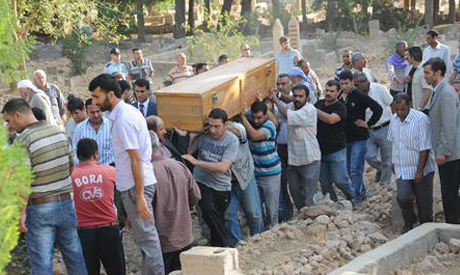
Relatives carry the coffin of a victim who was killed by a mortar bomb, during a funeral procession at a cemetery in the border town of Akcakale, southern Sanliurfa province, October 4, 2012 (Photo: Reuters)
Standing outside his two-storey house, Mehmet stretched his arm through his shattered living room window, pulling at a tear in the net curtain as shards of glass crunch under his feet.
"This is how close we came," he said.
Mehmet was sitting at home with his family on Wednesday when mortars fired from Syria came crashing down near his house in Akcakale, a Turkish border town that has seen itself unwittingly sucked into the conflict raging in its southern neighbour.
The 36-year-old handyman, who would only give his first name, gathered his family and elderly mother and led them out onto the street outside. It was only then he realised just how close the shells had fallen.
"We came out and saw our neighbour's house completely destroyed. It was awful," Mehmet said, tears welling in his eyes.
A mortar bomb fired from Syria struck the house just across the narrow street from his own, killing two women and three children from the same family and wounding several others.
The mortar tore a gaping hole into the courtyard wall and shell fragments pockmarked the building. A blue metal gate now stands warped and riddled with shrapnel holes.
"For the last 20 days we haven't slept, we're worried about what will fall on our heads. This was not the first time they have hit us," he said, pointing to a small crater nearby.
Mortars have been landing on this town of 40,000 since last month when rebels seized the Syrian side of the Akcakale border gate from President Bashar al-Assad's forces, who have been shelling the area ever since.
Wednesday's attack was the most serious cross-border incident in the 18-month-old Syrian uprising and underscored its potential to escalate into a regional conflict.
GHOST TOWN
Up and down the 900 km (560 mile) border, Turks are growing increasingly frustrated at the violence spilling into their towns and villages and at the tens of thousands of Syrian refugees who are now sheltering on Turkish soil.
"Look at the refugee camp they've built for the Syrians. Where have they built it? Right at the exit to our town. So the Syrians fire mortars at us. We act like a magnet," said Ibrahim Cilden a few houses down from Mehmet.
"Our town has become a buffer zone."
While life in the bustling town centre goes on as normal, Mehmet and Ibrahim's neighbourhood lies adjacent to the border and now resembles something of a ghost town, with empty houses and shuttered shop-fronts. The town's schools have been closed.
"We are 13 or 14 people living here. What can we do? We can't even work. Where can we go? Everybody is leaving, everybody is shutting their shops," said Abdullah Turk, sitting outside his family's tailors.
Most people in Akcakale are ethnic Arabs whose forebears became Turkish citizens when the border was drawn up after the fall of the Ottoman Empire. Many men wear the traditional Arab gown and red and white headscarf, and Arabic is the first language of the majority.
Despite these ties however, many in Akcakale resent their southern neighbours. Since the Syrian rebels seized parts of the border area, a growing number of Syrians are crossing without going through official checkpoints, residents complain.
"A man just rides up to the border and crosses on his motorbike, can you believe such a thing?" said Turk. "We are ruined. Akcakale is ruined."
Turkey responded to Wednesday's mortar attack with artillery strikes and parliament gave the government power to order further military action in the case of another similar event although Ankara said it was not looking to go to war.
But for some residents in Akcakale the government's response has done little to quell their concerns.
"We are stuck in the middle, what is this? If we're going to go to war, let's go to war but right now we're sitting here like targets," said Cilden.
Short link: